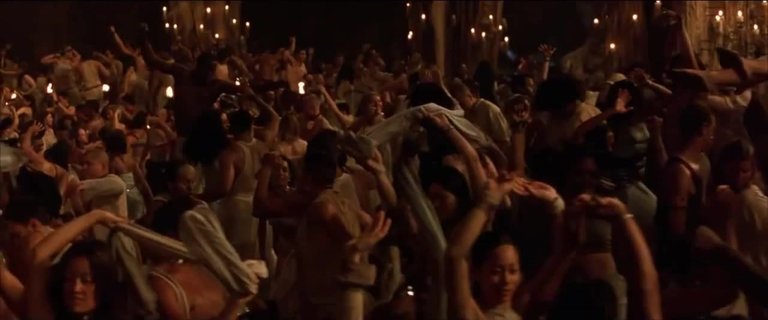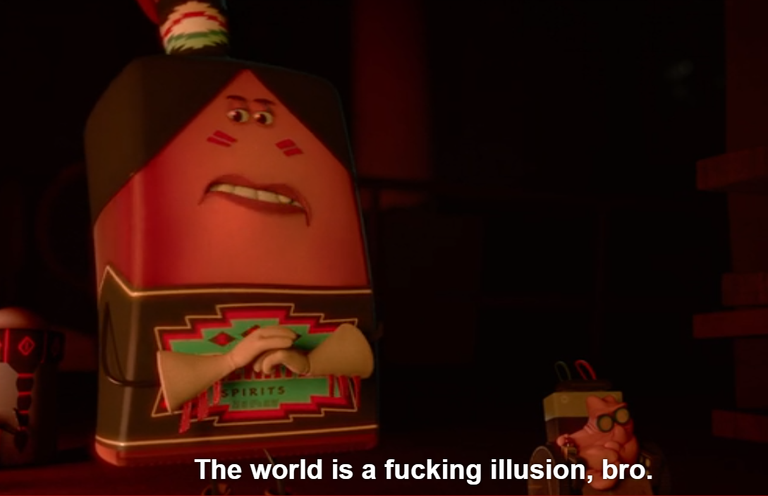(Originally published 17 January 2018)

Part II — The Tzimtzum of the Gluon Field (Or, The Trauma of the Orgy-Yet-To-Come)
“The Woman does not exist.” — Jacques Lacan
The Revolution
We might be tempted to avoid the direct theological message of Sausage Party because it is masked with juvenile stoner comedy. But comedians are really the priests of our secular religion, dressed in black and refusing to obey the rules of censorship, decency, political correctness. They symbolically take on all of the shit that’s inside us like a scapegoat messiah, they preach that all of our sacred cows are ultimately powerless and we are secretly — and radically — free. Comedy is Nature’s prophecy. The stand-up routine is the Netflix homily.
It should be unsurprising, therefore, that these secular priests act like regular priests and try to justify their illicit behavior, try to avoid the same guilt they laugh off in catharsis. One-by-one, from Bill Cosby to James Franco, they fall like dominoes to allegations of sexual misconduct.
Something perverted haunts this priestly class, some paranormality that they abuse for their own benefit. It runs parallel with their position apparently transcending the normativities they reinforce. They impose a vertical Law by standing outside of that Law themselves and telling us “These binary relationships — Good and Evil, Male and Female, etc — are laughably absurd (or hopelessly tragic) when I point them out, but only I am allowed to point them out and only in these sacred (comedy) halls.” They make themselves blasphemous lawgivers only to reveal their impotence and hypocrisy: their phallic, vertical theology has failed to overcome the Phallus itself, failed to free us from the destiny of Hell, Samsara, and Eternal Recurrence. They answer the vertical Law of God with the vertical Law of the Nietzschean Antichrist, and their sausage party of verticalisms ends in flaccid emptiness.

Seth Rogen’s Sausage Party is a self-consciously theological comedy, following in the glorious tradition of Dogma (1999) and Angels in the Outfield (1994). The storytellers frame the narrative as a relationship between the Gods (human shoppers at a grocery store) and Food, subject to the seemingly random selection of the Gods to go into the Great Beyond. This paradise outside their various wrappers and packaging will, they believe, be the place where all intimate relations are permitted: sausages can be with buns, peanut butter with jelly, whatever.
But the Great Beyond, they come to find out, is not a paradise, but just the normal outside world where the Gods (people) eat and use their groceries. Baby carrots are chomped to death, potato skins are peeled away in shrieks of agony. Heaven turns out to be a horrifying fraud.
The Food manage to unite against the Gods. They kill all of the shoppers who wanted to eat them. They kill the store clerk — the symbolic superego or angel of death or Satan figure who sweeps aged and expiring Food into the black oblivion of his janitorial trash can. And they kill Douche, the fellow grocery item who betrays the rest of the Food out of vengeful anger and commits abominations like cannibalism (which Douche connects to divinity) and sodomy with the store clerk. With all of their enemies defeated, the Food is now free from the threat of being eaten, but they are also free from the lie of the Great Beyond.
They are radically free, free to make their own rules, to follow their own Food spirits.

And so they immediately break into a massive pansexual orgy.
Everyone has sex with everyone.
This is the truth of Sausage Party: stripped of our religious delusions, we will first seek revenge upon the Gods that deceived us (“God is dead, and we have killed him”). And, being free of the Gods, we will immediately indulge every fantasy that we denied ourselves as people of faith, in particular the shedding of sexual taboos.
What Sausage Party imagines as an orgy of bodies is portrayed elsewhere as a revolutionary political explosion, a paradigmatic shift in intellectual thinking, an awakening of a spiritual or religious fervor, a celebration after successfully overcoming impossible odds.
In Christianity, for example, Saint Paul talks about how Jesus, with his death and resurrection, stripped the spiritual powers of their authority and dominion, publicly parading them in their shame (Colossians 2).
Paul talks about how the Divine Law was a stern teacher while we were pupils, but faith in Christ is our graduation beyond the teacher’s authority. (Galatians 3)
Paul says we were cut off from the Source, like wild branches dying on the ground, and that the perfect Son of Abraham grafted us into the family tree of God (Romans 11).
In all of these models for talking about the Revolution, we see that the former things— separation, judgement, ideological oppression, Divine Law, condemnation, Death — are gone, and the new freedom is here in our midst. “I can’t believe we were saving ourselves for the Great Beyond when… it was right in front of us the whole time,” Frank the sausage says to Brenda the bun at the end of the love feast.
The Kingdom of Heaven is among you, Jesus says.
The Carpocratians, the early Christians who gave up all private property and held sacramental orgies, seemed to understand the revolutionary potential in these ideas. Like the Food after their victory, the Carpocratians celebrated their freedom by overcoming old taboos and demonstrating a progressive, though still patriarchal, sexual egalitarianism. They believed in radical freedom, the kind where Law and punishment are gone and people are free to love and share and think for themselves. They delighted in the bodies that formed the communion for their agape feasts, and they knew that the shackles of old taboos and legal prohibitions — like eating food sacrificed to idols or setting aside a day other than the Sabbath for gathering together — were tools for their own transfiguration, not axioms around which their lives needed to revolve.
But the Carpocratian movement didn’t last. The Oneida community in nineteenth-century New York with similar ideas didn’t last. Christian orthodoxy was never able to sustain the energy of these revolutions in gender theory and sexual egalitarianism, and the Church consistently isolated and rejected communitarian movements that dared to play with these erotic fires. Instead, as discussed in Part I, the “Church Fathers” encouraged celibacy, virginity, and chastity, as well as the idea that sexual activity disconnected from procreation was, in fact, indulging in worldly appetites. In the Kingdom of Heaven, Jesus says, there is no marriage: God’s children will be like the angels — supposedly unwed and un-reproductive.
But the early Church was also caring for the orphans of failed marriages, and for the socially-isolated who suffered from sexual diseases, reproductive obstacles, or genital abnormalities. The leadership of the Church (all male-bodied, for female bodies and the self-castrated were forbidden from the priesthood) encoded their doctrine of sexual health as authoritative. They locked up sexual energy and stifled any nuance to gender identity, and they locked in the amplification of incestuous guilt as the necessary volume of all sexuality. As far as our bodies are concerned, the revolutionary victory is something entirely yet-to-come, something angelic, something a-sexual, something that has no correspondence to the seductive sensations of sexuation.
And so sexual iniquity became the typification of all sinful subjugation. True liberty in Christ is freedom from the sin of Sex itself, safeguarded by the Church’s exaltation of virginity, protected from the passions that threaten to engulf us, body and soul. These first sexual puritans of Christ’s Church assume they sit opposite orgiastic revolutions because they correctly diagnose the titanic powers of sexual energy. But these new gods have not overcome the Revolution. All they’ve done is relocate the orgy, reproduce it in the form of the tormentous passions of the souls in hell, damned to burn with the worldly fires they loved too much.
Does the Revolution only produce new gods, new Patriarchs that once again promise the Great Beyond if only we follow their laws? Is there no end to the spinning of this wheel without some phallic outside breaking in? And why would we choose these new vertical gods demanding virgin purity? Why would we not take the Carpocratian course and embrace the fires of the orgy? What do we do with this tremendous erotic power at our disposal if not indulge in the passions of our liberation?
“Who is my mother, and who are my brothers?”
When Christians became notorious for their supposed incestuous relationships, the evidence against them was pulled directly from their Messiah’s testimony. “Hate your Father and Mother,” he said, “forsake marriage and become a eunuch for the Kingdom.” Jesus’ revolution was obliterating proper family order — the pagan imperialists worried — violating the very core of imperial Roman morality and, indeed, the nuclear heart of all human society. Wild sexual conflagrations sparked by this Christian movement would turn civilization to savagery as every principle of decency and wisdom turns upside down.
In the Gospels, Jesus establishes a popular following in Galilee, a rural northern province of Judea, the Roman colony occupying the ancient homeland of the Israelite tribes. His movement is political and economic in its institution: not particularly militant anti-imperialism like the Zealots or narrow religious separatism like the Essenes. Instead, Jesus spends his preaching time in Galilee denouncing the hypocrisy of the religious conservative establishment, pushing their ideology to its own imminent implosion, its sub-nuclear antagonisms and inconsistencies. Over and over, Jesus shows them that their devotion to God’s Law turns that Law into a license for their exploitations, that the nuclear Law has quantum excesses where its energies become unstable.
The Law of God, like the nucleus of an atom, is internally divided, a unity achieved by piecing together differently-charged elements: positive and neutral, finite and infinite, love and duty, male and female, freedom and equality, God and Creation. The Pharisees figured out how to use those internal divisions of the Law to bypass their legal responsibilities without inculpating themselves, how to release the atom’s destructive quantum energies while still acting like the atom remains intact. And they used this short-circuiting logic in their formal teachings and traditions to sustain their private property, position, and authority: to propagate their ideological normativities as definitive and divine vertical Law.
The Pharisees, the supposed guardians of the every-day, fly-over, conservative Jewish populace, created a tradition that enabled them to claim devotion to the Law without ever having to follow it themselves. The liberation of these religious bourgeoisie from the constraints of the Law, like comedians free from the rules of political correctness, only turned them into darker masters dwelling in the transcendent, beyond-good-and-evil space of the revolutionary orgy. This is why Jesus is constantly calling them out for their hypocrisy: they believe themselves to be free, and the rightful masters of the masses at the bottom end of their vertical binary.
But Jesus has no praise for the Pharisees’ enlightened tradition and the supposed freedom it gives them over God’s Law. “I praise you, Father, Lord of heaven and earth,” Jesus says after pronouncing judgment on the petite bourgeois towns of Galilee, “because you have hidden these things from the wise and intelligent, and have revealed them to little children.”
These criticisms crescendo until Jesus starts engaging in some religious civil disobedience: feeding the poor and healing the sick on the Sabbath, when the religious Law demanded rest.
Rest, according to revolutionary Pharisaical short-circuiting logic, means not having to love your neighbor as yourself.
When Jesus realizes he’s caused a scene, he leaves, but keeps on healing and helping. And soon after he draws attention by miraculously healing a man of his visual and speaking impairments. The miracle, he claims, was a successful exorcism of the demon responsible for the man’s afflictions. The local religious authorities whisper to the contrary, that Jesus’ power is itself demonic and his miracles the work of the devil.
The legendary temper of Jesus ignites. Responding to these blasphemers, Jesus first threatens the Pharisees with eternal condemnation, naming them viper spawn and innately evil, impotent to produce genuinely-good lives. Still hurling woes, Jesus condemns the entire generation of religious experts who obsess over signs and spiritual phenomena, calling them “adulterous” — an interesting use of a term meant to convey marital infidelity. But how, precisely, has this generation been adulterous?
At the end of this rebuke, we find out that Jesus’ family has arrived, looking to speak to him. Presumably, Jesus caused such a scene that his family felt compelled to intervene. Maybe some of them even sympathized with the Pharisees politically, maybe their family rabbi followed the Pharisees. Maybe Jesus’ family thought he was in danger and they wanted to shut him up for his own good. Maybe they wanted to show their support or get backstage passes.
Because when the Family breaks down, everything else goes with it. Every conservative counter-revolution is, at its core, the safeguarding of a carefully-crafted institutional bloodline apparatus: classist, racist, patriarchal. The intervention of Jesus’ Family, and his Mother in particular, is the best weapon Jesus’ enemies could hope for: use Christ’s own Blood against him.
Whatever their reason for interrupting him, Jesus’ response is certainly one of the most radical, revolutionary, and disruptive statements in all of the Gospels:
“Who is my mother and who are my brothers?” And pointing toward his disciples he said, “Here are my mother and my brothers! For whoever does the will of my Father in heaven is my brother and sister and mother.” (Matthew 19)
His closest relatives show up, those few loves who are bound to him by blood, and he pierces right through the nucleus at the heart of this Family. But what he reveals is not the Pharisees’ beyond-good-and-evil freedom. Christ does not offer a simple orgiastic revolution, opening a new liberty from the Law that defines strict Nuclear-Family relations. Instead, Christ expects an even stricter interpretation of those relations, insisting that there is a worldwide family structure that’s deeper and truer than its earthly shadows. Jesus exposes the greater Bond, the quantum level space where the Law of the Family — the glue of Blood that supposedly safeguards society — is transcended.
This deep ocean of subatomic glue is the same dangerous territory where radical, orgiastic freedom is truly possible, where devotion to the Law always manages to turn into manipulation of the Law to suit one’s private purposes. It is the plane where we choose to respond to the chaotic passions of reality: embracing them in atheistic jouissance like the orgy of Food in Sausage Party, being consumed by them, or trying to dominate those passions with fraudulent, appropriated divinity like the antichrist Douche, the archetypical Consumer.

Visualization of Quantum Chromodynamics, a String Theory hypothesis of Strong Force interaction between quarks and gluons.
But this quantum field of the Family is also where transfiguration and new partnerships can emerge. Like the gluon field of particle physics — where a cloud of gluon particles appears out of the virtual void of nonexistence to act as a bridge between other particles, only to disappear after the connection is made — the Spirit of Christ emerges as the revolutionary bridge between the Father and His Children.
The Revelation
When the orgy settles down and the Food reigns supreme over the grocery store, the theological message of Sausage Party enters mysterious and foreign territory of what comes after the revolutionary exuberance. What happens after the slaves overthrow their masters and claim their freedom? How does life go on after the apocalypse?
Sausage Party, like Christ, answers that question with another question: Will the Food, after the passion of the Revolution fizzles out, still choose to live on, still choose the specific and narrow channel of life?

The citizens of Zion dancing in their Temple, from The Matrix: Reloaded
In another apocalyptic orgy scene, this time from the Wachowski’s The Matrix: Reloaded, the citizens of Zion — the last city of human civilization standing against the Machines — erupt into a frenzy of sweaty, sticky dancing. The dance itself occurs in two settings: the Temple below, where the mob pulses together in a foam of body-bubbles; and the bedroom of Neo and Trinity above, literally slamming their naked bodies together in rhythm with the Temple’s drums. But hidden deep in the mind of Neo (the One) is the trauma of Trinity’s death, the loss of the objet petit a and the climactic, hopeless orgasm at the end of the orgy. “She is going to die, and there is nothing you can do to stop it,” the Architect tells Neo just before his fateful decision to save Trinity instead of condemning Zion to another samsaric turn.
Trinity is the localization of all of Neo’s desires. Even though he will give his life to save his people, as far as Neo is concerned, without Trinity there is no point to Zion. This singular focus, this loyalty to a particular identity in relationship with Trinity, is why Neo’s choice to save his one-true-love, despite knowing she will die anyway, proves to be the choice that results in peace between humans and machines. Choosing to stay faithful to Trinity’s love (remember, the Oracle says that the one she loves would be the One) means being faithful to her mission for Neo, even when she is physically absent. Neo must be the One for Trinity’s sake, even when she dies.
The One saves Zion by his loyal love for Trinity and his faithfulness to her love for him, their destinies and hearts intertwined. Neo vanishes and leaves behind a New Creation where there is peace, transparency, and perhaps even a community between the once antagonistic humans and machines, a collapsing of the worlds of spirit and matter. The love of Trinity gives birth to something truly New.
In Sausage Party, the mystical cinnamon whiskey (aka “Firewater”) and the scientist gum (aka “Sorbitol Mannitol…”) discover that their reality is a fictional world created by actors in another universe. “Our lives are being manipulated for the entertainment of monsters,” Firewater says, “Puppet masters in another dimension.”
“We’re something called… Cartoons!”
Gasps jump out from the rest of the revolutionary heroes. The real enemy is not the gods, who were the same fabrications as the rest of their Grocery Store Universe. The human actor is the real enemy, stealing control from his virtual (cartoon) projection. Saint Paul could hardly write a better analogy for the power of the flesh to dominate the spirit.
But Firewater and Gum — the Faith and Science tag-team — have built a stargate out of a toilet seat, allowing the party to pass through and “cut the strings once and for all.” And once again, a revolutionary choice is put before the Food: to be or not to be; to take a leap of faith or stay behind and try to make the orgy into something satisfying.
The characters all walk through the stargate together, believing that the other side of the universe is worth exploring with the ones we love. Frank the sausage and Brenda the Bun join hands, leaving the revolutionary orgy behind, choosing instead to be devoted to their higher calling and a more personal partnership. “As long as we’re together,” Brenda says to Frank, “I’m ready to get baked and do anything.”
The problem with the revolution — the outburst of wild passions, the declarations of freedom, the victory parades and the battles of Armageddon — is that it ends, that life goes on after it, and the victory parade can very easily turn into a funeral procession.
Every utopian dream will succumb to nightmares.
Every wild orgy will be overthrown by the veneration of virginity.
For Capitalism, for Communism;
for Holy Roman Empires and Third Reichs;
for democracies and monarchies;
for civilized and savage,
there is no sustaining the dream forever.
The revolutions occurring in sexual identity and gender theory are no different, dreaming as they do of utopias free from the gods of Patriarchy and “toxic masculinity.” There is no revolution in gender or race or class relations that will prevent the infiltration of new authoritarians, new phallic pigs ready to walk on two legs.
Even the ultimate revolution, heaven on earth, has a hidden terror inside it that will drive it to a final consummation: the Dragon breaks free from the pit after the thousand years and makes one last war against the Saints (Revelation 20).
The great utopian victory signifies the healing of the collective Conscious without healing the collective Unconscious — the stain that remains after the defeat of the institutional authorities, after the “death of God.” The orgiastic celebration at the culmination of any revolutionary Spirit is traumatic because, like Neo’s dream of Trinity’s Death or Firewater’s revelation of the Food’s cartoon nature, the collapse of the orgiastic-utopia reveals the collective Unconscious in its ugly, nihilistic truth: universal death and destruction, existential meaninglessness, is predestined. The wheel of eternity is Real, and it is a nightmare. Sexual energy, like the kind unleashed in the orgies of our utopias — those dreams of Capitalism, Communism, Fascism, Liberalism — is fundamentally impossible and unsustainable.
We can have the orgy, yes. We can dissolve into the hellish expanse of our radical freedom, but we’ll always be left with the dragon chained down in the pit.
And while revolutions and reformations have been won throughout history, our own immediate past has witnessed only failed rebellions against the global order. Like in Animal Farm, sooner or later even the Communists become Capitalist pigs. From the October Revolution to Philadelphia’s MOVE, victory over the Masters — White Supremacy, the military-industrial complex, Mammon, Patriarchy, imperialism and colonialism, the principalities and powers — has been short-lived, replaced by newer, hybrid corruptions. Other attempts at self-determination have been simply crushed outright.
But while our visions of a better world get destroyed, the security of the empire — the one consolation in a world without a utopian vision — is revealed as fraudulent! We don’t even have the bourgeois Capitalist dream to fall back on anymore, spoiled as it has become by unipolar dominion of the elite powers. September 11, 2001, no matter the details of how it occurred because all directions point to diabolical evil, is the only proof of this existential insecurity we will ever need.
So when Sausage Party ventures into this territory of what comes after a successful revolution, when there are no more enemies and no more prohibitions, we have no point of shared experience with the Food in the film. All across the planet, we are still shackled to the Gods, these demons in anthropotechnic and institutional form that ignore and exploit the greater realities around them, consuming life like any other commodity. We have slavery and slave trades, we have warmongering and genocide, we have starvation and gluttony and addiction and depression. We are slowly winding down our options for an acceptable status quo, the fragmented remainders of utopia haunting our dreams and memories, driving us deeper into authoritarian madness.
The sausage-party truth of our miserable reality is that any revolution taken on by impotent phalli is only going to produce a new, weaker verticalism. But this is, nonetheless, a revelation of truth: traumatic truth, castrated and powerless, but still truth.
Sibling and Sovereign
Two religious representations are explicitly depicted as achieving harmonious resolution in the Sausage Party’s victorious orgy: Judaism and Islam. The Bagel, an intentional Jewish stereotype, bickers throughout the film with Lavash, who waits for his 70 bottles of virgin olive oil and despises bagels for colonizing his territory. In the end, the allegory of the Israel-Palestine conflict and its religious substrata resolves in the gay love of Bagel and Lavash.

But where is Christianity in the film?
The conservative Christian answer is to say that the Gods represent institutional Christianity, and so therefore the film is hopelessly and obviously pagan.
The leftist, revolutionary-Christian answer is to say that the orgy is the Christian impulse, the fullness of freedom delivered in a crass cartoon.
And while both are right, neither is complete.
Sausage Party rejects the ideological model represented by Christianity when it operates as an oppressive state apparatus, an opiate to delude and propagandize the masses: the Gods, the “Christian” ones in this case, are enemies to be defeated. And every Christian since the Reformation has known this be a critical part of the Church’s communal sanctification. The Church must always be in permanent revolution in this way, semper reformanda.
But the failure of conservative State Christianity does not make the incendiary, revolutionary approach the necessary orthodox-Christian response. Radical “Death-of-God” Christianity a la Paul Tillich and Peter Rollins overlaps the crucifixion and the resurrection, equating the defeat of the Beast with the establishment the Kingdom. The cross is sufficient for salvation, but what the savior does after that is his own business. And while this type of Christianity blends into the World by providing an opening for Christian atheism, its loyalties are to Freedom at all costs, even at the expense of all things supernatural.
Death-of-God, religionless Christianity is a victory without a vision, a Kingdom without a King. These “censored dreams,” as Slavoj Žižek calls them, are just invitations for bigger threats. Jesus said as much when he said that when you cast out a demon, it’s sort of like cleaning out your house: if you don’t take precautions, you are going to end up with a worse demonic infestation than before.
“When an unclean spirit goes out of a person, it passes through waterless places looking for rest but does not find it. Then it says, ‘I will return to the home I left.’ When it returns, it finds the house empty, swept clean, and put in order. Then it goes and brings with it seven other spirits more evil than itself, and they go in and live there, so the last state of that person is worse than the first. It will be that way for this evil generation as well!” — Matthew 12
When the Gospel is about personal agency, full subjectivity, individual integration beyond the slave morality of Absolutes and Meaning and Being, the Sausage Party![harry voldemort fall.gif] orgy turns into the final scene and the Food presumably expires. The sausages and buns sweep the house clean and put it in order, and shouldn’t that be enough? Isn’t that precisely the message of Rollins and the progressive Science cult: that in the end we all just expire, that life is meaningless, so go out and make some meaning for yourself? Nothing in this Gospel is new: it’s in Nietzsche and Nebuchadnezzar, Heidegger and Herod. Will-to-power of this variety always creates abominations.
So when Rollins claims to include the Resurrection in his pyrotheology, we should not be surprised to find nothing but the same old atheism that celebrates the divinity of chaos rather than the God who rules the chaos.
But Christ passes through the chaos of the orgy to reveal a clear, victorious vision, a bond beyond biology. Because what biology tells us is guilt and shame and heteronormativity: there is no biology without a brutal phallogocentrism. To draw from Harry Potter, there is no constraining the power of the Elder Wand until we, like Harry, pass through Death and rise with the Wounded One.
( )
)
But worthy is the Lamb who was slain! For the wound of death revealing the inescapable orgy-yet-to-come is also the space for the true freedom of submission to the Sovereign.
Surrender to the teachings of the Master; repent, and believe the Gospel, the Messiah says. But what does it mean to repent of our sexual identities, to repent of the orgy of passions we fear will doom us to Eternal Recurrence? We need some kind of outlet for the radioactive reality of the trauma that is sexuation, some discipline to master the hands, eyes, and organs that can offend us with their constant cycles of utopian dream and flaccid failure. And how can we trust religious authorities that refuse to overcome their operative and oppressive Patriarchies?
“To the unmarried and widows I say that it is best for them to remain as I am. But if they do not have self-control, let them get married. For it is better to marry than to burn with sexual desire.” — 1 Corinthians 7
Saint Paul instructs followers of Christ to get married instead of “burn,” warning them that the confines of marriage are better than the consequences of illicit and lustful sexual conduct. But to echo what I’ve said elsewhere, within this conservative impulse is the inherent Law of Grace, the open door for multiple-partner marriage relationships, queer-normative sex-organs on demand. What is a marriage, what is a Nuclear Family, when there is no “male and female” anyway?
Managing the powers of sexual passion, according to Paul’s command, is the point of marriage. You get married so you can avoid burning. You partner up so you avoid all the nasty things that happen when the intensity of sexuality is in control of You instead of You in control of it. If you don’t have the gift of singleness, the grace that lends you some authority over your sexual energy, then bind yourself, Paul says, to a specific vow designed to contain that energy. Give your body — the one that is a Temple of the Holy Spirit, that is a member of the One Body of Christ — to a partnership of bodies. Control your sexuality by pouring it into a shared space with someone else’s, a void where you and your partner both give and retract yourselves, expending and sharing and renewing that critical part of your inner fire, the fuel that makes you, as Saint Paul says, “burn.”
As Paul sees it, this shared space — what Rob and Kristen Bell, borrowing from Kabbalah, call zimzum — occurs within the defined parameters of a sacred vow. It functions correctly in a relationship where the partners fall in love, collapse into this zone of give-and-take, and not where partners are chosen because of calculated efficiency or probable success. This zimzum (spelled tzimtzum on Wikipedia) is a shared fireplace where erotic flames can dance together in harmony rather than in the open where they will consume the house.
And that harmony is not achieved through uniting flame A to flame B, but by the mysterious power of the fireplace, the channel that orients the flames toward one skyward outlet. The containment zone of the fireplace, like the tzimtzum of a marriage relationship, suddenly emerges out of non-being as the very space required to generate a warm home.
But the founders of Christianity knew that marriage on Earth was only a tool for teaching us about the one heavenly marriage. This tzimzum bridge between marriage partners, like the gluon field, only reveals more plainly the reality of the traumatic orgy, the inescapability of the doomed revolution: but this time, failure occurs in the revolution of the Family itself.
The Nuclear Family — husbands, wives, children — can never supply the true jouissance of radical freedom we seek in our utopias. Patriarchies, hierarchies like the Gods in Sausage Party, must be dethroned. But the best our tzimzum marriages can do is reify, reproduce, the original opposition that causes us to burn in the first place, opening us up to new revolutionary seductions, counter-revolutions that insist we accept the orgy, the trauma, as permanent. Marriage, holy and strong, is only defensive armor against this mighty Eros who will betray the sacred vow at the slightest opportunity. The commandment against committing adultery exists precisely because the power of sexual energy — like the power of life and death — is divine in origin. The revolutionary orgy, like the Crucifixion, is the path of God, but only when crucifixion turns into resurrection, only when the commandment to faithfulness is followed and the vow kept intact.
And the early Christians — orthodox and Carpocratian — knew this to be true. Earthly singleness is preferred by both Paul and Jesus because it opens the relational status of wholly devoting our passions to our sovereign marriage partner, Christ. He is the savior of our sexual spirits, providing a single normative orientation: faithfulness to our particular vows, and a common femme bridehood — an egalitarian status of openness to the creational, generative, healing grace of the Savior’s justice.
Because there is only one marriage — like there is only one utopia — that can ever produce life out of the chaos of the tzimzum space; there is only one channel for the smoke to exit the erotic fireplace. And if we are penitent enough to throw off our old gods, there remains only one choice in the wake of the orgy’s trauma: to join hands with your brothers and sisters and leap through the stargate of faith, or to succumb to the chaos of the orgy.
The real Good News about sex is that the trauma is real, that sexuality — gender or orientation or fetish or fixation — will never make our dreams of completeness come true, will never supply jouissance, utopia, or integrated-full-subjective-agency. Sex, like race or class, needs to pass through the transfiguring fires of the orgy of chaos and death. Like Christ, all of our sexual identities are submitted to the Passion of crucifixion, all adulteries are seen in terms of loyalty to this single bridegroom.
And if our sexuation dies with Christ, then it must also rise again, repented and reoriented and transfigured into proper relationship with him. “For if we have become united with him in the likeness of his death, we will certainly also be united in the likeness of his resurrection,” Saint Paul tells the Roman Christians. We share his Body and Blood, but we also share his bed. That one Marriage is sacred beyond all others, and it sexualizes all Creation as feminine in relation to his single masculinity. This is either the most brutal misogyny ever devised or the only true romance ever written, and if we choose to be romantics we might discover that this one Patriarchal exception grounds the egalitarian rule: We are all of us, no matter our body-type, female equals, except for our brother the Servant King, the wounded phallus — the only one capable of knowing, and healing, our wounds.
He is our sibling and he is is our sovereign. He is the Stargate that lets us leave the trauma of the orgy behind without surrendering to our expiration dates or establishing new Gods.
The only question is, will you join your fire to his?
Will you swear off adultery from this holy marriage, and release the energy of your passion through the One narrow channel?
Will you take up his cross and his promised resurrection, knowing that while you’re together, you can truly get baked and do anything?
In “Part III — The Tantra of Armageddon” we’ll move from the trauma of the revolutionary orgy to the martial arts of apocalyptic Christianity by entering the sex-toy marketplace of Beautiful You by Chuck Palahniuk.
Joshua Bean is a freelance and aspiring author, Master of Divinity (Cairn University 2011), and full-time parent.
©Joshua Craig Bean 2018 all rights reserved.


Hi! I am a robot. I just upvoted you! I found similar content that readers might be interested in:
https://medium.com/@jcb7/the-quantum-family-part-ii-eb676bdd226c